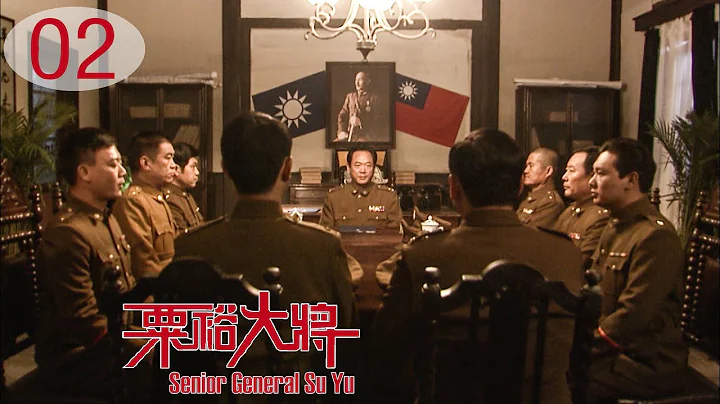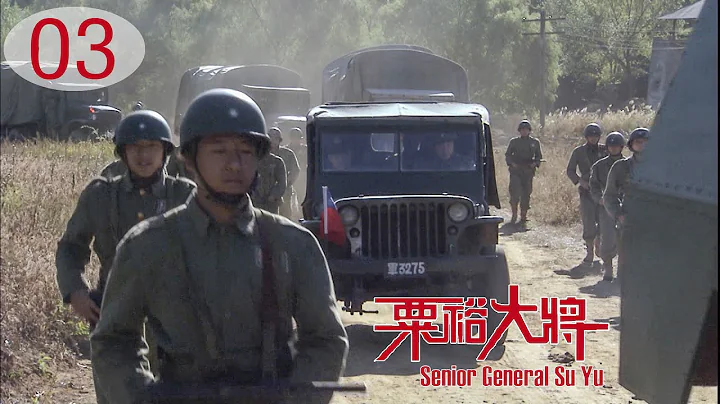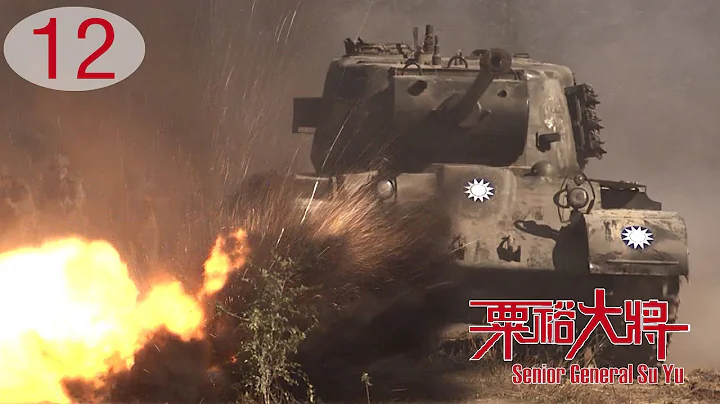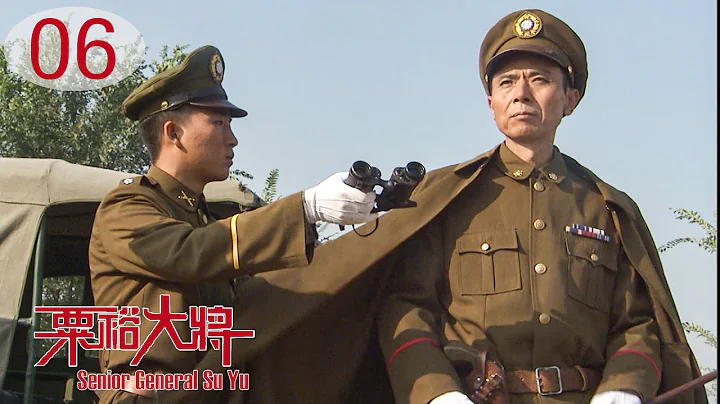The top ten marshals and top ten generals selected by our country in the first full-scale military ranking ceremony in 1955 have always been the figures talked about by military fans. Their deeds of conquering the south and the north during the revolutionary war are fascinating.

Among them, Su Yu was the first of the top ten generals of the founding of the People's Republic of China. Too many people deeply regretted that he was not elected marshal. There were also many rumors that he was originally qualified to be appointed marshal, but he humbly gave up. This Only then was he ranked first among the top ten generals.
I think the main reason why there are such rumors is because Su Yu's contribution in the Liberation War was so great. During the War of Liberation, Su Yu served as the deputy commander of Huaye , but he was actually the actual commander of the Huaye army. During the War of Liberation, our army annihilated a total of 8.07 million enemies, of which 2.45 million were annihilated in Huaye, which was the largest number of field armies. The most in .
To be more detailed, at that time, our army fought 38 battles in which more than 30,000 enemies were wiped out at one time, and Su Yu commanded 12 of them. There were 23 battles in which more than 50,000 enemies were wiped out, and Su Yu commanded 8 of them. , so it is not an exaggeration to say that he was the first hero of the Liberation War.

Did Su Yu really give up during the selection of the marshal? The author first makes his opinion clear: No, in fact this statement is not supported by historical data, and Su Yu did not meet the criteria for selecting a marshal at all. Let me talk about my own opinions below.
First of all, let’s clarify the historical significance of the first major military award. At that time, it had been nearly six years since the founding of the People’s Republic of China. The political situation across the country was stable, the revolution had achieved decisive victory, and it had just defeated the arrogant United States on the Korean battlefield.
This award is not a reward and commendation for a certain stage, but a summary of the hard work of our army since its establishment. In other words, it depends on both merit and hard work.
Below, we will look at several conditions for selecting marshals to see if Su Yu meets the standards compared with the top ten marshals:
First, the current Chairman of the Central Military Commission and a member of the Central Military Commission

This article was written by Mr. Peng and Luo Ronghuan to Chairman Mao As mentioned in the report, regarding the selection of marshals, "everyone unanimously agrees that the current Chairman of the Military Commission and members of the Military Commission".
At that time, Su Yu served as the chief of general staff of the People's Revolutionary Military Commission, but was not a member of the Military Commission. He was only co-opted as a member of the Central Military Commission in November 1956. Therefore, he does not meet this requirement.
The second is the leader or participant of important armed uprisings during the founding period of our army.
Our army was founded in 1927 Nanchang Uprising , but at the same time there were some important uprisings that also played an important role in the growth of the Red Army , such as Autumn Harvest. Uprising , Guangzhou Uprising , Pingjiang Uprising , Baise Uprising , etc.
Among the ten marshals, Zhu De, Liu Bocheng, He Long, Chen Yi, and Nie Rongzhen were all important leaders of the Nanchang Uprising. Ye Jianying, Nie Rongzhen, and Xu Xiangqian were the leaders of the Guangzhou Uprising. Peng Dehua led the Pingjiang Uprising, and Luo Ronghuan participated in the Autumn Harvest Uprising.

Although Su Yu also participated in the Nanchang Uprising, he was only the guard squad leader, and his position was too low. Of course, some people may also point out that Lin Biao in the Nanchang Uprising and Luo Ronghuan in the Autumn Harvest Uprising also held very low positions. This question will be answered in the next standard.
3. The main founders or leaders of the main base areas of our party and our army
The struggle of our party and our army was very arduous, especially during the Agrarian Revolution. The major base areas are the fundamental guarantee for the continuation of the revolution and an important support for the development of the army.
Among the ten marshals, Zhu De, Peng Dehuai, Lin Biao, Liu Bocheng, Luo Ronghuan, Nie Rongzhen, and Ye Jianying were the main founders and leaders of the Central Soviet Area. Xu Xiangqian was the main founder of the Hubei-Henan-Anhui Base Area and the Sichuan-Shaanxi Base Area. The main leader of the three-year guerrilla war in the province, and He Long was the main founder of the base area in western Hunan and Hubei.
Although Su Yu also participated in the leadership of the Southwest Zhejiang Revolutionary Base , firstly, the influence of the base area was relatively small, and secondly, the Southwest Zhejiang Base was actually part of the three-year guerrilla war, so in terms of status, it was far behind the major base areas. larger.

It can be seen from here that although Lin Biao and Luo Ronghuan had a low starting point in the early stage, they developed rapidly and had surpassed Su Yu's level at this time.
The fourth is the position held during the Red Army period, the Anti-Japanese War and the Liberation War.
During the Red Army period, Zhu De was the commander-in-chief of the Red Army, Lin Biao, He Long, and Peng Dehuai were respectively the Red 1, Red 2, Red 3 Corps, Corps Commander, and Nie Rongzhen was the commander of the Red Army. Political commissar of the 1st Red Army, Liu Bocheng is the Chief of General Staff of the Red Army, Chen Yi is the main leader of the guerrilla warfare Red Army in the eight southern provinces, Luo Ronghuan is the director of the political department of the 1st Red Army, Xu Xiangqian is the general commander of the Red Fourth Front Army, Ye Jianying is the first red army. Army Chief of Staff.
At that time, Su Yu had been a division commander for a long time. His highest position was only chief of staff of the 7th Red Army, and he was not the main army, one level behind the marshals.

During the Anti-Japanese War, Zhu De, Peng Dehuai, and Ye Jianying were the commanders, deputy commanders, and chiefs of staff of the Eighth Route Army respectively; Lin Biao, Liu Bocheng, and He Long were the commanders of the three main divisions; Nie Rongzhen and Xu Xiangqian were the deputy division commanders, and Luo Ronghuan was the director of the division's political department; Chen Yi served as The generation commander of the New Fourth Army.
At that time, Su Yuze only served as the commander of the New Fourth Division of the New Fourth Army, and in terms of rank, he was at least one level behind the marshals.
During the War of Liberation, Su Yu's position was closest to that of the marshals. He served as the deputy commander of the East China Field Army, and later served as the acting commander.

However, all the marshals at that time were at the level of military region commander, field army commander, and political commissar. Among them, Mr. Zhu served as the Commander-in-Chief of the People's Liberation Army, and Ye Jianying served as the Deputy Chief of General Staff. The lowest position was probably Xu Xiangqian, Marshal Xu, who served as the First Deputy of the North China Military Region. The position of commander.
But in terms of organization, the major field armies are affiliated to the major military regions. Although the North China Military Region does not have a field army, it is on the same level as the East China Military Region , so Su Yu is still half a level lower than Xu Shuai.
To sum up, when the army was awarded the title in 1955, Su Yu did not meet any of the above criteria for evaluating marshals. In other words, in any of the above aspects, there was a certain gap between him and the top ten marshals.
However, Su Yuneng was rated as the top ten generals, surpassing many veteran revolutionaries who were more senior and "hardworking" than him. This is also our party's recognition and recognition of his immortal contributions in the Liberation War. Commendation.

Although General Su Yu could not be rated as a marshal as rumored, but he gave it up, his ability to command large corps in combat is recognized as one of the top three in our army, and he is worthy of the "military" rating given to him by many people. The title of "god", marshal or general does not affect Su Yu's status in the history of our country and our army at all!





















